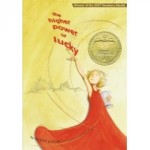 On January 22, 2007, the American Library Association awarded The Newbery Medal (the most prestigious book award for children’s literature) to Susan Patron for her book “The Higher Power of Lucky.” The book is about a ten year old girl named Lucky living in a tiny town in the California desert who fears being abandoned by her guardian. Some schools around the country, however, are banning the book from their school libraries. Why? Because on the first page of the book there is a reference to the word “scrotum.” Lucky overhears someone talking about how a rattlesnake bit a dog on the scrotum and she wonders what that word means.
On January 22, 2007, the American Library Association awarded The Newbery Medal (the most prestigious book award for children’s literature) to Susan Patron for her book “The Higher Power of Lucky.” The book is about a ten year old girl named Lucky living in a tiny town in the California desert who fears being abandoned by her guardian. Some schools around the country, however, are banning the book from their school libraries. Why? Because on the first page of the book there is a reference to the word “scrotum.” Lucky overhears someone talking about how a rattlesnake bit a dog on the scrotum and she wonders what that word means.
By banning this book from school libraries, parents and educators are saying: “we don’t want kids to know what this word means.” From a developmental point of view, this creates an obstacle to normal growth and development. Kids during late childhood are intensely curious about how the world works, and in particular, with how their changing bodies work. Banning a book because of the word scrotum sends a message that there is something shameful, bad,embarrassing, or wrong with the word, and by association, with male genitalia.
Hiding information about sexuality from kids who are on the verge of puberty is like stopping tourists at the state line and taking away all the maps and books they have about the state that they are just about to enter. Without knowledge, kids are likely to get lost. And they do in fact, get lost by the millions in early adolescence in contemporary society, because the adults in their lives have refused to help them understand what they are going through biologically and emotionally during the early stages of puberty.
By providing kids with access to knowledge through books and other media, we’re expanding their horizons. And by answering their questions about sexuality honestly, we can assist them in safely navigating their way through the choppy waters of adolescence.
Read an interview with the author of “The Higher Power of Lucky” Susan Patron.
For information about the developmental issues surrounding childhood and adolescence, see my book >The Human Odyssey: Navigating the Twelve Stages of Life

This article was brought to you by Thomas Armstrong, Ph.D. and www.institute4learning.com.
Follow me on Twitter: @Dr_Armstrong


















